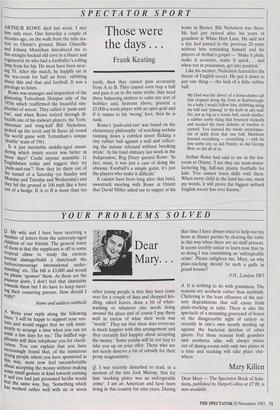SPECTATOR SPORT
Those were the days . . .
Frank Keating
ARTHUR ROWE died last week. I met him only once. One Saturday a couple of decades ago, on the walk from the tube sta- tion to Orient's ground, Brian Glanville and Johnny Moynihan introduced me to this straight-backed old cove in a blazer and regimental tie who had a footballer's rolling limp from his hip. He must have been near- ing 70. After the match, he happily sat in the tea-room for half an hour, rabbiting about this and that and football. It was a Privilege to listen.
Rowe was manager and inspiration of the glistening Tottenham Hotspur side of the 1950s which reaffirmed the beautiful sim- plicities of soccer. They called it 'push-and- run', and when Rowe retired through ill- health one of his stalwart players, the York- shireman and wing-half Bill Nicholson, Picked up the torch and lit flares all round the world game with Tottenham's unique double' team of 1961.
Is it just inevitable middle-aged maun- dering which insists soccer was better in those days? Could anyone assemble 11 Englishmen today and suggest they try Push-and-run'? Now they let them out of the tunnel of a Saturday (or Sunday and Monday and Tuesday and Wednesday) and they hit the ground at 100 mph like a hare out of a hedge. If A to B is more than ten yards, then they cannot pass accurately from A to B. They cannot even trap a ball and pass it on in the same stride, they need three balancing stutters to calm any sort of bobbler and, heavens above, present a £5,000-a-week player with an open goal and if it comes to his 'wrong' foot, then he is sunk.
Rowe's 'push-and-run' was based on the elementary philosophy 'of watching urchins running down a cobbled street flicking a tiny rubber ball against a wall and collect- ing the instant rebound without breaking stride'. In his fond obituary last week in the Independent, Reg Drury quoted Rowe: 'In fact, mate, it was just a case of doing the obvious. Football's a simple game, it's just the players who make it difficult.'
It cannot have been long after that brief, awestruck meeting with Rowe at Orient that David Miller asked me to supper at his home in Barnet. Bill Nicholson was there. He had just retired after his years of grandeur at White Hart Lane. He said not a day had passed in the previous 20 years without him reminding himself and his players of Arthur's gospel — 'Make it plain, make it accurate, make it quick . . . and when not in possession, get into position.'
Like his mentor, Nicholson feared for the future of English soccer. He put it down to just one thing — the lack of a little rubber ball: My Dad was the driver of a horse-drawn cab that clopped along the front at Scarborough. As a baby I would follow him, dribbling along my ball and 'passing' to the kerb or any wall. No, not as big as a tennis ball, much smaller, a rubber sorbo thing that bounced wickedly and needed the most delicate of touches to control. You learned the whole encyclopae- dia of skills from that one ball. Matthews learned everything — everything — with his tiny sorbo toy; so did Finney, so did George Best, so did all of us.
Arthur Rowe had said to me in the tea- room at Orient, 'I see they are mass-manu- facturing big, full-size plastic footballs for kids. You cannot learn skills with them. When every child in the land has one, mark my words, it will prove the biggest setback English soccer has ever known.'










































































 Previous page
Previous page